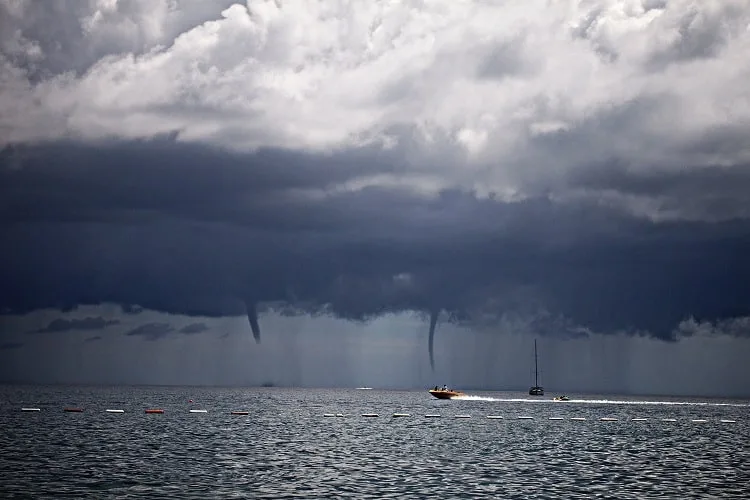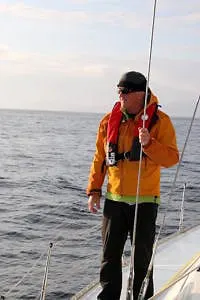 The ocean can be a very unforgiving place and while most sailors have given some consideration to emergency preparedness (i.e. stocking first-aid kit, flairs, etc.), very few (with the exception of some offshore racers) have actively trained for performing in extremely challenging conditions.
The ocean can be a very unforgiving place and while most sailors have given some consideration to emergency preparedness (i.e. stocking first-aid kit, flairs, etc.), very few (with the exception of some offshore racers) have actively trained for performing in extremely challenging conditions.
As I recently discovered, there are several ways that the average sailor can prepare themselves mentally for extremely challenging situations. I had the pleasure of interviewing Roger Friesen, a Professor at the University of the Fraser Valley, a specialist in Performance Psychology, and a consultant to some of the world’s foremost sailors and athletes (e.g. The Vic-Maui offshore racers and Olympic teams).
What is performance psychology?
In short, performance psychology allows people to enhance their performance in difficult situations. Performance psychology is based on the premise that we can move towards mental and emotional health and train our thought processes. It looks for ways to help people be more mentally and emotionally robust, learn to manage pressure, and develop the tools, skills, and strategies to remain calm in times of stress and pressure.
How can performance psychology be used in sailing?
In sailing, we’re constantly being asked to perform tasks, duties, and make decisions. Our performance can be compromised because of fatigue, fear, or outside stresses.
Yet sailing requires our full attention. Part of performance psychology is the question, “Where is my focus, where is my attention?” And if I notice that it is compromised in any way then of course the question becomes, “What is causing me to have divided attention?” The skills, tools, and strategies of performance psychology can equip an individual to manage themselves in tough situations.
As sailors we spend a lot of time preparing our boats for emergencies, how should we think about preparing ourselves?
Performance in essence includes five things:
- The technical and tactical (e.g. managing the boat, understanding weather)
- The physiological (e.g. staying hydrated, avoiding sea sickness)
- The psychological (e.g. being able to interpret information, and making good decisions)
- The emotional (e.g. managing emotions appropriately)
- Team (e.g. communicating with spouses or sailing partners)
In the old days “performance” simply referred to the way one executed their particular skill and we paid no attention to the other aspects. For example, the old model would assume we either like our sailing partners or we don’t and that was it.
Most people still devote their attention to making sure the boat is safe and ready and that their requisite skills are up to par and forget about the psychological, emotional, and team aspects of performance. In order to maximize our full potential we need to prepare mentally and emotionally as well.
How can we become more psychologically prepared for challenges offshore?
While some people are born with a predisposition to handle pressure better than others, I’m happy to report that anyone can become more mentally tough and emotionally robust with intentional training and awareness.
The first question to ask yourself is “What compels you to embark on a voyage?” I think people should consider this quite seriously because it’s when we make flippant or careless decisions that have major consequences attached to them that we get into trouble.
Alternatively, if we think seriously about it and have a rock solid answer to the question, “Why am I doing this in the first place?” and that answer is because it speaks to something deeper in the core of who we are, well chances are we are going to be in a better position to handle a difficult or challenging situation.
There’s also what I like to call “mental toughness dry land training”. Dry land training refers to training that facilitates getting faster and stronger but doesn’t directly have anything to do with your chosen sport.
Because we’re talking about training our mental process and emotional response, in reality, every waking moment can be dry land training for mental toughness.
This means that as I’m going through my day if I encounter a situation that makes me frustrated or angry, the first thing I can do is develop awareness.
Ask myself, “What are my reactions and responses?” and, “Was that an appropriate reaction of response or could I have reacted or responded more effectively?”
So when we react to a family member, spouse, kids, or anything that has the potential to make us frustrated, it’s an ideal opportunity to learn about mental toughness and then start acquiring the skills, tools, and abilities to handle pressure.
Lastly, just as we would attend seminars that are related to the technical and tactical aspects of sailing, I would encourage people to seek out seminars and training that deal with the psychology of sailing. There is also a growing wealth of information in books.
We can read, talk, and learn about the principles and strategies, and then at a certain point, we also need to integrate this information into what we’re doing. This means being observant, learning the tools to debrief a situation, and understanding what your reactions are when things get difficult.
Whether we’re sailing with a racing team or cruising with our spouse, how can we prepare ourselves to be successful as a team?
The more we know about each other, our triggers, and our skill sets, the more we’ll know how we’re likely to respond in tough situations.
I think it’s important to know these things before we leave shore. It does happen that people put all their time into getting their boat ready and then they head off with ambition and enthusiasm and the next thing you know they’re in the midst of a nasty storm and things start going sideways.
Suddenly people start reacting and responding in a way that is actually compromising not only them but potentially also the team and the boat. It would be tragic to learn these sorts of things in the heat of the moment. Better to learn these things well in advance so as not to be blindsided by some unexpected team dynamic.
Do you have any tips for averting a crisis on the water?
I came across the expression, “What’s the next thing that could kill me?” in Chris Hadfield’s book, an Astronauts Guide to Living on Earth and it resonated immediately.
For Chris Hadfield, the significance of the question was quite literal because in space travel there are so many things that could go wrong and there’s no possibility of external help. So, “What’s the next thing that could kill me?” became his mantra.
It was not a doom and gloom question but a way of examining potential scenarios and exploring what he would need to be able to do if that scenario happened. So ultimately that question became a question of preparation.
Of course, sailing is close to Chris Hadfield’s world in that there are things that can kill us and once we go offshore external help may be a long way off. Trying to anticipate, from either one’s own or another person’s experience, means that when something does happen, we’re completely prepared.
What causes fear and how can we manage it?
Fear is our reaction or response to something that is either unknown (we don’t understand something so we fear it) or where there’s a potential of major injury.
Consciously or unconsciously we will do everything we possibly can to keep ourselves safe. I mean safe not just in the physiological sense but also in the psychological and emotional realm.
I would encourage people to read a brilliant book as part of their preparation I encountered recently called The Fear Project, by Jaimal Yogis. It explains fear, how it presents itself, what people tend to do when they are functioning from a platform of fear, and what they can do to overcome it.
Have you ever had a difficult situation at sea where you’ve had to rely on mental toughness?
Yes! A friend and I were sailing across the Atlantic in a 45’ Jeanneau. About 36 hours after leaving Bermuda, I was on watch and it was a fairly peaceful day, with nothing threatening going on. I was in the cockpit enjoying my thoughts and the realization of the experience that I’d longed for since I was a teenager.
I was in the midst of this watch when it suddenly occurred to me that for the first time in my life I was beyond the reach of help. If something happened it would be my friend Dave and I. It would be our wits, resolve, and resources that would determine whether we would be okay or not.
It occupied my entire thought process for the ensuing 24 hours and I realized that it was something I had to come to grips with. That if something happened and it escalated to a point where we couldn’t handle what was going on, essentially I had to be okay with my own death.
That was a very interesting experience for me to work through. I eventually came to grips with the fact that if that would be the conclusion of the story, that would be okay and I essentially made peace with myself.
It was like this weight was lifted off my shoulders and I suddenly felt this deep sense of calm and clarity. It stayed with me for the rest of that trip and it was a difficult trip in that the weather conditions that year were challenging.
It was not pleasant sailing and yet after that moment, the sense of peace and calm stayed with me. That really caught my attention as it was probably the culmination of many of these ideas and concepts.
Roger Friesen grew up on the prairies, far removed from the physical world of sailing. He read voraciously of explorers, from the land and sea alike, and became obsessed with the idea of sailing. It wasn’t until he moved to British Columbia that he and a friend taught themselves how to sail on a 28-foot Columbia. Since then Roger has crossed the Atlantic and takes every opportunity to sail with his wife around the Pacific Northwest. To learn more about Roger’s work go to rogerfriesen.ca.
Fiona McGlynn is an award-winning boating writer who created Waterborne as a place to learn about living aboard and traveling the world by sailboat. She has written for boating magazines including BoatUS, SAIL, Cruising World, and Good Old Boat. She’s also a contributing editor at Good Old Boat and BoatUS Magazine. In 2017, Fiona and her husband completed a 3-year, 13,000-mile voyage from Vancouver to Mexico to Australia on their 35-foot sailboat.


